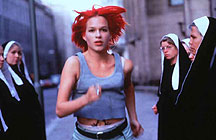|
|
|
|
Run
Lola Run
|
 |
|
Tom Tykwer's Run Lola Run is full of extraordinary, thrilling moments. The thrills have less to do with the characters and their situation – three times over, Lola (Franka Potente) runs to save her boyfriend, Manni (Moritz Bleibtreu) from a criminal deal gone wrong – than what the camera, the editing and the music are doing. Lola runs – the film could be a physical fitness ad – and the camera sprints alongside her, the cityscape blurring in the background. A sudden burst of slow motion at the height of frenetic drama is accompanied by the dreamy pop standard, "What a Difference a Day Makes". Montages at lightning speed flash forward and backwards, regularly giving a glimpse of tales and destinies parallel to the main story. Not since Scorsese's Casino (1995) has a movie whisked us so exuberantly through space, time, architecture and action. Tykwer even takes one of the greatest clichés of show-off film technique – stretching out and filling up the seconds it takes for an object thrown into the air to hit the ground – and makes us gasp at the result. In conception, Run Lola Run joins a crowded family of recent movies devoted to either telling a story in multiple ways (Flirt [1995], Sliding Doors [1998]) or showing it, in a scrambled chronology, from different points of view (Go [1999], Jackie Brown [1997]). Such prismatic structures run the risk of tedious repetition – and Tykwer, for all his wit and ingenuity, falls foul of this problem occasionally. Run Lola Run has been harshly criticised in some quarters for its trippy weightlessness. Since it is the kind of film in which everything is possible, nothing is especially meaningful, or carries any value. Life is just a game, a vast cosmic jest, a haphazard throw of the dice. Yet, heavy prefatory quotations and symbolic inserts (clocks, the heavens, allusions to Hitchcock's Vertigo [1958]) aside, it would be a mistake to take Run Lola Run as much of a comment on anything. Like some of the earliest French Nouvelle Vague films, it is purely an expression of a joy in making movies. As such, it replaced Lock, Stock and Two Smoking Barrels (1998) as the textbook for aspiring film school students eager for something to pillage in the late '90s. MORE Twyker: Winter Sleepers © Adrian Martin October 1999 |
![]()